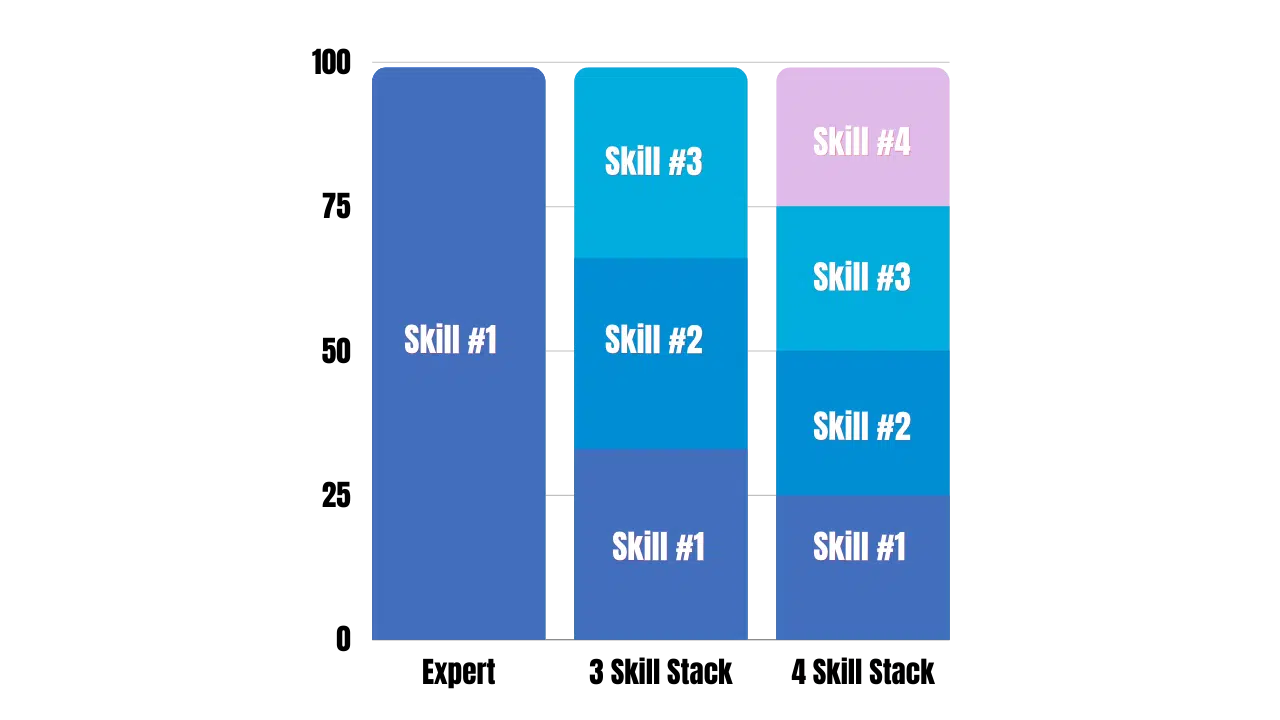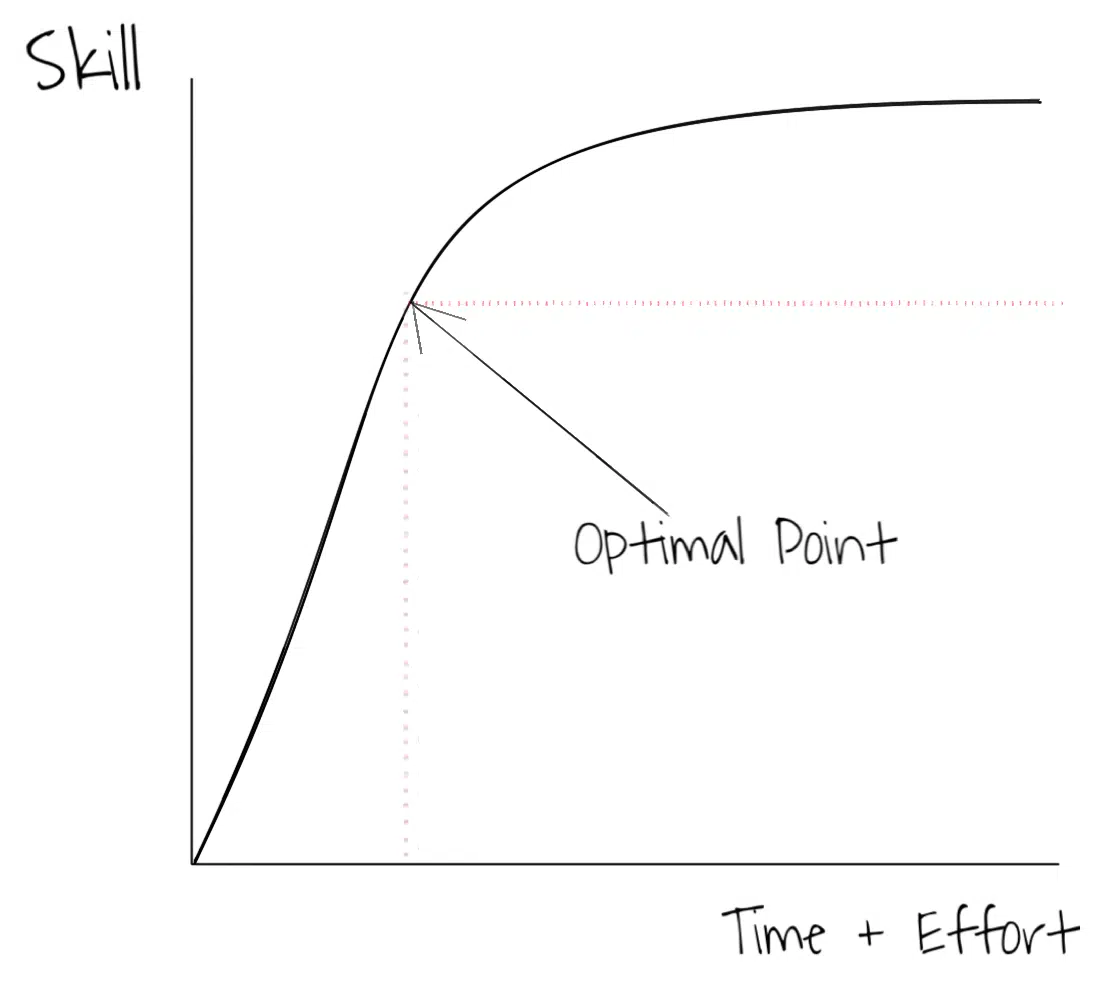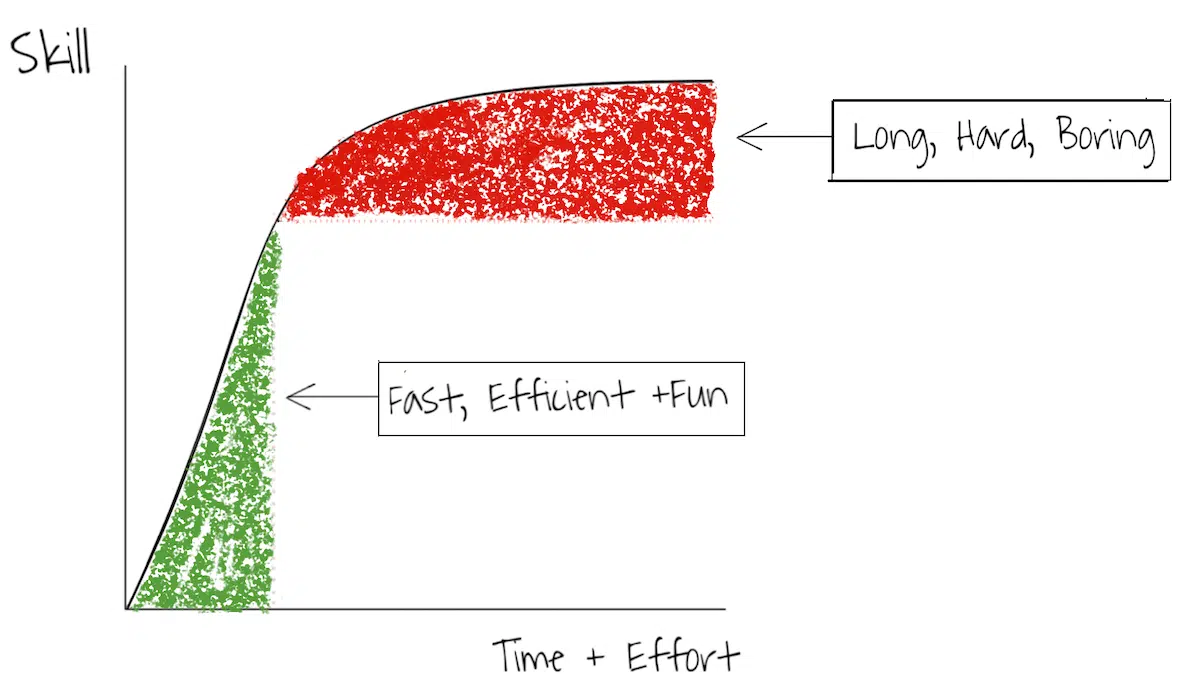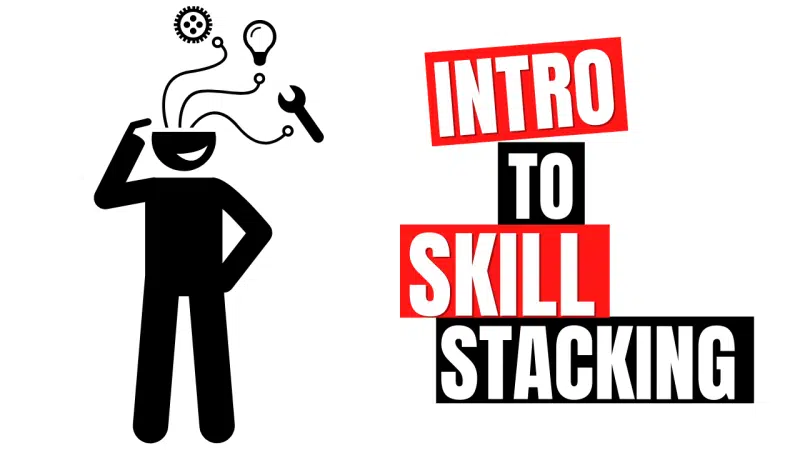If you've been in the entrepreneurship space for more than just a few months, you've heard things like "become a master of something" or "stop chasing so many different things!"

These statements aren't wrong but there is more to them than it appears on the surface. As you read this article, I want you to open yourself up to the idea that maybe there's more to success than what we've been told about specialization and becoming amazing at one particular thing.
Although there are countless examples of singularly skilled specialists who have found amazing business success, it isn't the only way.
For many of us, it just isn't the best way to create a successful business and fulfilling work.
In fact, by learning multiple skills that work synergistically, we can stand out even further from the pack and much more quickly.
So, read this article with that in mind.
My success in business and the successes of hundreds of thousands of other entrepreneurs wasn't a result of being world class in one specific area.
Read on to lean more about this exciting concept: skill stacking.
What Is Skill Stacking?
Skill stacking involves combining separate skills in a way that creates something of unique value.
Instead of focusing on mastery of one area, we focus on competence in multiple areas that work synergistically.
Skill stacking therefore means that we should aim to be in the top 25% of 3-4 things that can be combined to create something of unique value.

The key is that the skills complement one another. Being able to play piano and fly airplanes are impressive skills, but it's unlikely you can make them complement one another.

Bo Burnham stacked his piano skills with his sense of humor to make a unique stand up routine
Being able to play piano and tell stand up jokes however can be paired synergistically. Comedian Bo Burnham combined these two skills into a wildly successful standup career.
Scott Adams and Other World Class Skill Stackers
I didn't invent the idea of skill stacking but I'm most likely one of the most enthusiastic fans of the concept.
The idea was planted in me after hearing multiple stories in books, blogs and podcasts about a guy named Scott Adams.
Scott Adams worked in corporate America for several years. He had a set of unremarkable, but above average skills and experiences that when combined, led him to become a multimillionaire.
- He was a good but not great artist. He dabbled with cartoons and sketches that were good enough to catch your attention but not amazing enough to keep it for very long.
- He was funnier than most people. He wasn't going to headline at the Apollo, but he was funny enough that he was often the funniest person in a medium sized room.
- He had a relatable perspective. He had been a part of the stereotypical 9-5 office setting. A world ripe for parody for anyone observant enough to notice the humor in it.
Scott combined his three relatively common skills together and created something that was unique.
The Dilbert Comic.

Adams created Dilbert by combining 3 unremarkable things into something much bigger. Above Average Humor + Above Average Drawing + Insight into Relatable Community.
We all know someone like Scott, but it's unlikely we know someone who turned their marginally impressive talents into a fortune.
This is the power of skill stacking.
Although his story is my favorite to reference because of its obvious uniqueness and unforgettable results (he doodled his way to a multi million dollar net worth) Adams is far from the only notable skill stacker you know about.
Mark Zuckerberg isn't a world class developer, he was above average. It was the synergy created from supporting skills that made him the billionaire that he is today.
- He knew how to bring people into the company to improve growth.
- He knew how to spot opportunities before others.
- He developed thick enough skin to handle the conflicts that many other developers avoid.
- He understood how to effectively monetize the network he had built.
All of Zuckerberg's supporting skills could be learned and developed without complete, singular focus.
In the world of sports, highly effective wide receiver Julian Edelman isn't in the top 1% in any of the standard measurables (which my computer's spell check is telling me is not a word, but I stand by it) that NFL scouts look for.
He's not tall.
He isn't going to jump out of a gymnasium or outrun every defender.
He is just average or slightly above average in many facets.
But, he's elite because he stacks synergistic skills that make him a tremendous asset on the gridiron.
- He runs great routes consistently
- He doesn't drop many passes
- He knows how to read defenses and find opportunities to get open
- He's strong enough to not get literally ripped in half when he does have the ball
He enjoys success in his career that many of the guys breaking records at the NFL combine in speed, agility and strength usually don't. He has a unique skill stack that when applied together make him an elite NFL wide receiver.
All of Edelman's supporting skills could be learned and developed without complete, singular focus. He has a unique skill stack that when combined on the field make him unique and elite.
There are Julian Edelman types at the top of nearly every sport and it's part of what makes them all so enjoyable to watch.
I've experienced this in my life (to a far less dramatic or noticeable degree).
I'm not in the top 5% of anything I do in my business. My best skill is growing businesses through blogging and that would only grade as very good, not world class.
Other skills involved in my business include things that others could dedicate entire lifetimes to mastering if they liked...
- Paid traffic (Google, Facebook and other mediums)
- Search Engine Optimization
- Sales and Persuasion
- Outsourcing
- Project Management
- And a dozen other subtle skills that you only notice as you go along...
There is always someone who can do something better or someone who knows more than me. I've been in the same room many times with people who trump me in the things I do.
Fortunately, skill stacking has allowed me and others like me to thrive in spite of the fact we aren't remarkable in one specific area.
Instead of trying to master one thing or "stay in one lane," we went broad and made it work. If the end goal is satisfaction, most of us are winning at a high level.
Now, I'm going to show you why you might find it to be both as effective and fulfilling (emphasis on fulfilling) as I do.
Then, if you decide it's for you, I'm going to show you and how to start building your own skill stack for success in your own business.
Note: This Concept Requires a Loose Idea of Ranking and Measurement
One difficulty of writing this article was explaining the broad concept of measuring a skill, experience or trait.
For example, being in the top 20% of a field is not always measurable. Being "more in tune with a community or niche" is also very abstract and immeasurable.
Please focus on the underlying concepts rather than the minute details and exact numbers. Rephrase ideas like "the top 20%" when they apply to things that are difficult to quantify or unquantifiable in terms you prefer such as "better than most," or "very proficient."
Likewise, the amount of time and effort it takes to master something is highly debatable and variable based on person. Dissect how long full mastery might take for you and identify what 80% proficiency would look like and plan accordingly. Later in this article, I'll cover how the 80/20 (Pareto Principle) comes into play here.
I use the phrase, "enough to be dangerous," when discussing my own skill stack. What that looks like is subjective but you'll have a good feel for it. Use your instincts. Adapt and learn more if you feel that you undershot your target originally after you actually see how things play out in your business endeavors.
Precision and perfect efficiency, while highly satisfying when possible, isn't always possible in skill acquisition.
Please question everything I'm saying and call me out in the comments with anything you notice that could be an exception to what I'm sharing. There are several exceptions but dwelling on them would require a book rather than an article.
Why Skill Stacking
Here's why skill stacking is such a beautiful thing. As mentioned above, please forgive my lack of absolutes in the list below. Many of these are subjective and may or may not be the case for you like they have been for me and others.
#1 It Can Be More Fun
I know I know, business isn't all about how much fun you can have, but most people seem to put "fun" far too low on their list of work priorities. We live once, why do we accept the fact that work has to be boring?
Only 49% of Americans for example claim to be fully satisfied with their work. You don't have to accept that and you shouldn't accept that.
Skill stacking allows us to pursue different topics of interest as long as they work synergistically with one another to create something of extreme unique value in the end (more on that to come).
#2 It Can Be Easier
Listen, I value learning more than most people (hopefully that shows in my 300+ blog posts here) but if we can get the same amount of value in less time, it would ironically go against the same intelligence we're chasing not to do that.
If you're familiar with Pareto's Principle (the idea that 80% of results come from 20% of the output) it becomes obvious why being in the top 20% is the number we're aiming for.

The Pareto Principle claims that spending 20% of the time on something can drive 80% of the results. I believe that applies to learning.
For someone who is focused on skill stacking, we should focus towards this 80/20 point and then proceed to learning our next skill.

Theoretically, we can learn 5 skills at 80% proficiency (an amazing stack repertoire) in the same time it would take to become a master at one. The amount of time it takes to master something is widely debated and Malcom Gladwell's 10,000 hours theory posed in his best seller Outliers is the common, default reference (although Princeton research claims to have totally debunked that notion).
For the sake of brevity, I'm not going to debate that point here. It could fill an entire book.
Back on topic...
Let's say you can only stack 3 skills for now and you achieve top 20% proficiency in each.
Being in the top 20% sets you apart from 80% of people, but being in the top 20% in 3 skills stacked together sets you apart from 99.02% of people! It's 20% to the 3rd power.
Top 20% x Top 20% x Top 20% = Top .008%
This is of course, only of value if the synergistic (much more on that to come), but hopefully light bulbs illuminated by pure excitement are lighting up in your head right about now.
#3 It Can Be More Rewarding
Creative types (like myself) love learning and we're often bored when we are restricted to just one topic.
Skill stacking allows us to draw outside the lines which, for me, is far more gratifying and exciting.
We can pursue things that haven't been done before. We get the fulfillment of feeling like creators and innovators instead of merely following a path to achieve something that a few others are already doing.
Instead of chasing the current "leaders" in a field, we're making our own fields.
#4 It Can Increase Your Chances of "Breakthrough" Work
When you skill stack, you begin to see opportunities everywhere. You'll start to make connections that others who have a more linear view of life are overlooking.
"When your only tool is a hammer, every problem looks like a nail."
English Proverb
Let's say you're building a tree house...
A hammer is great for driving the nails but terrible for cutting wood. A saw is great for cutting wood but terrible for painting.
Having multiple skills works like having multiple tools in your tool shed as you build a specialized project.
[The tree house is your business if you didn't catch that.]
Having the greatest hammer is awesome, but I'd prefer to have a good hammer, a good chainsaw and a good paintbrush.
"But why not just hire someone to do the rest or rent the tools," you ask? Great question, that takes me to the next point...
There is some irony in specialization as well. When you are a master of a topic, you may overestimate your understanding when things change or new variables become involved. Someone who doesn't assume they know everything often notice things experts over look.
Many scientific breakthroughs for example went totally against the commonly conceived notions of experts at the time they were introduced and ordinary people have helped with extraordinary advances throughout history.
Ignaz Semmelweis concept of Antiseptic hand washing to reduce the spread of illness and Peyton Rous's demonstration of the viral transmission of cancer went against the experts of their time.
In 2011, video game players accidentally figured out the structure of a retrovirus enzyme that scientists had misunderstood for over a decade.
In business, breakthroughs overlooked by experts can mean huge financial rewards.
#5 It Can Make Outsourcing Easier
"I don't need to know how to do everything, I can just outsource what I'm not good at."
This is 100% true and you should always leverage outsourcing when advantageous. However, skill stacking and outsourcing are not mutually exclusive.
First, your skill stack won't include every single beneficial task under the sun. Some things you just won't be able to really get to any time soon and that's ok. Although I identify as a "solopreneur," I've long stated that working for yourself doesn't mean working by yourself. I bring in help every week, even for tasks I can perform adequately.
Second, understanding how to do something at a basic level will help you better understand what to look for in a candidate. Many times early on in my career I hired low cost freelancers to do various tasks. Since I had zero experience, whatever they did, it looked masterful to me. In reality, they were often barely competent.
I often outsource tasks that fall under my unique skill stacks and I do it at a high level thanks to my own understanding of the task I'm hiring out.
We blindly trust people who position themselves as experts or professionals thanks to something called the authority bias by the way...read more on that here if you're interested. It's pretty enlightening.
It was only after I taught myself how to effectively run Google ads that I saw that the person I hired was burning money.
It was only after I studied the foundation of web design that I realized the developers I hired were awful, even relatively to their low ball pricing.
Finding Your Skill Stack
Ok, hopefully I've made a solid case for why skill stacking is so great for entrepreneurs and you're ready to build up your own stack.
So, where should you start?
Step #1 Assess Your Existing Skills, Traits and Experiences
Before we plan out what skills will be beneficial to your desired end goal, let's analyze what you've already got going for you.
Integrating your pre-existing skills, unique personality traits or experiences can save you a great deal of time. If possible, we should always try to build our skill stack around what we already have going for us.
Are you uniquely talented at a specific skill? Art, sales, SEO...anything.
Write these skills down and note your current skill level beside it. Again, this is a rough estimate and you can measure it however you want. I'm using skill as a percentage to others (example: Top 10%).
Here is what my skillset looked like before I started building my stack.
Skills
- Project management - Top 10%
- Writing - Top 10%
- Outsourcing - Top 20%
- Teaching Others Top 20%
Next, write down the experiences and personality traits that make you unique. Obviously, don't worry about adding a skill level here.
For personality traits, focus on just the things that make you stand out. This may be just one thing, that's fine.
Also, include any sort of unique passions or interests you have. Things that you'd enjoy doing or discussing with others at length.
Unique Personality Traits/Passions
- Funny
- Observant
- Obsessive
- Huge Baseball Fan
Finally, write down any unique experiences you have.
Experiences
- Youth Sports Coach
- Amazon FBA Seller
- Parent
- Economics Degree
- Bipolar Disorder
Step #2 Analyze What Skills Are Required for Your Goal
Now we should define what the end goal looks like. Start with the end in mind. What are you trying to create that will be uniquely valuable and what goes into it?
Think of every skill possible, no matter how small.
Step #3 Identify the Top 4 Skills You Need
Not every skill is created equally. Identify the skills that will be most impactful.
For many entrepreneurs, there are some skills that bottleneck the entire process so they need to be prioritized.
For me, the ability to work with WordPress and gather and send emails was critical early on in my internet marketing career. I couldn't do much else until I took care of those basics.
Fortunately, those weren't difficult. We need to be mindful of the time commitment each skill requires and I've found that these bottleneck skills usually aren't the most difficult or time consuming to learn.
- YouTubers need to learn how to film a video and upload it.
- Bloggers need to learn how to build a website and publish posts.
- E-Commerce sellers need to know how to source products and list them.
- Artists need to learn how to package and sell their services.
- Podcasters need to learn how to record audio effectively and syndicate it across the different networks.
- Etc.
None of the above skills mentioned take longer than a day or two to become proficient enough to remove the bottleneck.
Also, focus on the synergy of these skills. Which ones will "stack" best early. For example, if you learn 2 skills, do they complement each other right away or are they dependent on other skills to bring them together?
Examples of Successful Skill Stacks
I've already mentioned several skill stackers but I think "the more the merrier" when it comes to examples for inspiration.
Typical YouTuber Skills
- Video editing
- Basic filming
- Persuasion skills to keep viewers on channel
- Keyword research
Unique YouTuber Skills
- Everything previously mentioned
- *Unique experience with a niche or industry
- *Above average sense of humor
- Example: Mark Rober
Mark Rober
YouTuber (14mil+ Subs) //Former Nasa Scientist
Mark Rober combined his love and experience in science to create one of the biggest YouTube channels in the world.
- Can identify highly interesting topics
- Has a likable and unique personality
- Has unique previous experiences at NASA
- Great at filming and editing
- Knows how to keep viewers engaged
Typical Freelance Artist Skills
- Art 🙂
- Packaging and selling work/services online
- Basic sales and marketing
Unique Freelance Artist Skills
- Everything previously mentioned
- *Unique experience with a niche or industry
- *Art that caters to a unique niche
- Example: Wyldebyrd Art on Etsy
Lance Lockhart
Aviation Inspired Etsy Creator //Wyldebyrd Art
Lance Lockhart is a craftsman who is passionate about aviation and caters to others with high end creations on Etsy
- Talented creator
- Uniquely experienced with aviation
- Understands sales and marketing on Etsy
Typical E-Commerce Seller Skills
- Project management, Logistics and Outsourcing
- Negotiation
- Economics and Forecasting
- Basic Copywriting
Unique E-Commerce Seller Skills
- Everything previously mentioned.
- *Foreign language for negotiating deals with overseas suppliers or brokering deals for other sellers
- *Proficiency in acquiring investor capital quickly, safely and securely
Conclusion
Being unique is great there's many ways to do that beyond simply being the best in a well known field. Sometimes, it means creating your own unique field by combining non-unique skills together to create something special.
Go out and build your skill stack and create something amazing.
Email me at [email protected] when you do 🙂 I'd love to hear about it!

